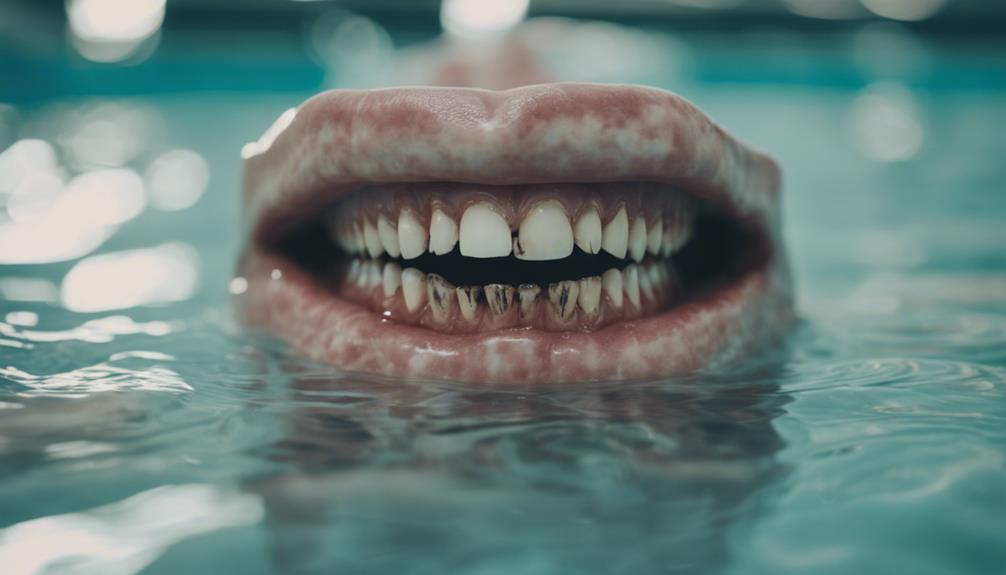In order to prevent UTIs caused by pool water, it is important to follow these steps. Always make sure to shower before swimming in order to get rid of bacteria. After swimming, shower promptly to wash away any contaminants. Change into dry clothes after swimming and remember to stay hydrated and use the restroom. Maintain proper pool hygiene by using chlorine and filtration systems. Avoid urinating in the pool to prevent infections. Swim diapers are necessary for maintaining cleanliness. Be sure to recognize UTI symptoms such as pain or cloudy urine, and seek medical help if symptoms arise. These tips are crucial for preventing UTIs from pool water.
Key Takeaways
- Pre-swim showers remove bacteria, reducing UTI risk.
- Post-swim, shower promptly and change into dry clothes.
- Maintain proper pool hygiene with chlorine and filtration.
- Use swim diapers to prevent contamination in the water.
- Stay hydrated to flush out bacteria and prevent UTIs.
Importance of Pre-Swim Showering
Showering before swimming is important for removing dirt and bacteria from your skin, helping to maintain ideal pool hygiene. Taking a quick shower for at least 60 seconds before entering swimming pools is a critical step in preventing UTIs and other infections.
By rinsing off before getting into the pool, you reduce the chance of introducing harmful germs into the water, which can lead to health issues. It's alarming that 51% of Americans skip this important pre-swim shower, as it diminishes the effectiveness of chlorine in keeping the pool water clean.
Proper pre-swim hygiene greatly lowers the risk of contracting UTIs and other infections from pool water. Encouraging all swimmers to adhere to this practice is essential for maintaining good pool hygiene standards and ensuring a safe and enjoyable swimming experience for everyone.
Proper Post-Swim Hygiene Practices
Maintaining good post-swim hygiene practices is essential in preventing UTIs from pool water.
After swimming, it's important to shower promptly to wash away any bacteria that may have accumulated on your skin. Changing out of wet swimsuits and into dry, clean clothing can also help reduce the risk of UTIs.
Drinking an ample amount of fluids and ensuring you urinate after swimming can aid in flushing out bacteria from your urinary tract, decreasing the likelihood of infection. Remember, it's important to avoid urinating in the pool as this can contribute to the spread of bacteria and increase the risk of UTIs for yourself and others.
Role of Pool Maintenance in Prevention

Proper pool maintenance plays an essential role in preventing UTIs from pool water. Maintaining appropriate chlorine levels and ensuring efficient filtration systems are critical steps in inhibiting bacterial growth that can contribute to UTIs. Regular monitoring and adjustment of pool chemicals are necessary to uphold a clean and safe swimming environment.
By implementing effective pool maintenance practices, the presence of harmful bacteria in the water can be greatly reduced, thereby lowering the risk of UTIs for swimmers. It's imperative to uphold the correct balance of chemicals and cleanliness in the pool to prevent the proliferation of harmful bacteria that could lead to urinary tract infections.
Therefore, adhering to a stringent pool maintenance regimen is paramount in safeguarding the health of individuals and promoting a hygienic swimming experience. Remember, a well-maintained pool not only enhances enjoyment but also ensures a healthier environment for all swimmers.
Risks of Inadequate Water Disinfection

Insufficient water disinfection in pools poses serious health risks, including the transmission of bacteria like E. coli and Cryptosporidium, which can lead to UTIs and other infections.
Maintaining proper chlorine levels and pH balance is vital to reduce the likelihood of contracting UTIs from contaminated pool water.
Addressing the risks associated with inadequate water disinfection is essential in preventing the spread of harmful germs and bacteria that can cause UTIs and other waterborne illnesses.
Waterborne UTI Risks
To safeguard against waterborne UTI risks, ensuring effective water disinfection in pools is paramount. Inadequate water disinfection can create a breeding ground for harmful bacteria such as E. coli and Staphylococcus aureus, increasing the risk of UTIs for swimmers. Additionally, the presence of chlorine-resistant parasites like Cryptosporidium in poorly maintained pools poses a significant threat to public health. Proper water treatment methods and regular testing are crucial to prevent the transmission of UTI-causing pathogens in pool water. Educating pool users on the importance of maintaining hygiene standards and adequate disinfection practices can help reduce the incidence of UTIs contracted from pool water.
| Waterborne UTI Risks | Effects on Pool Users | Prevention Methods |
|---|---|---|
| Harmful bacteria presence | Increased UTI risk | Regular water testing, adequate chlorine levels |
| Chlorine-resistant parasites | Higher infection likelihood | Proper pool maintenance, use of effective disinfectants |
| Poor hygiene practices | UTI transmission potential | Education on pool hygiene, promoting good habits |
Disinfection Importance
Ensuring effective water disinfection in pools is essential to prevent the survival and spread of harmful bacteria like E. coli and Giardia. Inadequate water disinfection poses increased risks of waterborne illnesses and infections. Insufficient chlorine levels or improper disinfection techniques create an environment where pathogens can thrive, endangering the health of swimmers.
Failure to maintain proper pool water disinfection can lead to skin infections, respiratory issues, and gastrointestinal illnesses due to the presence of germs and bacteria in inadequately disinfected water. Proper pool water disinfection involves regular monitoring and maintenance of chlorine levels and disinfection processes. By neglecting these important steps, you expose yourself and others to potential health hazards associated with contaminated pool water.
Therefore, it's critical to prioritize the disinfection of pool water to safeguard against the transmission of harmful bacteria and prevent the onset of waterborne diseases.
Health Concerns Addressed
Maintaining proper water disinfection in pools is essential for addressing health concerns, particularly the risks associated with inadequate disinfection, such as urinary tract infections (UTIs).
When pool water isn't adequately treated, it becomes a breeding ground for bacteria that can cause UTIs. Poor pool hygiene practices, like not showering before entering the pool or urinating in the water, contribute to bacterial growth.
While chlorine helps kill some bacteria, it doesn't completely eliminate the risk of UTIs. Proper water treatment and maintenance are vital to prevent UTIs from contaminated pool water.
By following good hygiene practices, such as showering before and after swimming, you can reduce the likelihood of contracting a UTI from pool water.
Benefits of Using Swim Diapers

By using swim diapers, you can effectively contain fecal matter and prevent contamination of pool water. Swim diapers are specifically designed to hold in solid waste, unlike regular diapers that absorb liquids.
In most public pools, swim diapers are a requirement for infants and toddlers to uphold hygiene standards and prevent contamination. These specialized diapers play an important role in reducing the spread of germs and lowering the risk of infections in pool water.
Proper disposal of used swim diapers is essential to maintain cleanliness and promote overall pool hygiene. By utilizing swim diapers, you not only adhere to the rules set by public pools but also contribute to a safer and cleaner swimming environment for everyone.
Hydration Tips for UTI Prevention

To prevent UTIs, ensuring proper hydration is key in flushing out bacteria from your urinary tract. In hot and humid summer weather, it's essential to drink plenty of fluids to maintain hydration levels and reduce the risk of UTIs. By staying hydrated, you promote frequent urination, which helps eliminate bacteria from your urinary system.
Dehydration in the summer heat can increase the likelihood of UTIs, underscoring the importance of adequate fluid intake. Proper hydration plays a significant role in preventing UTIs by keeping bacteria levels in check. Remember to drink water regularly throughout the day, especially when spending time in the sun or engaging in activities that make you sweat.
Recognizing UTI Symptoms Post-Swim

Recognize the symptoms of a UTI that may occur after swimming to guarantee prompt treatment. UTIs post-swim pose a potential risk due to the presence of bacteria in pool water, making it vital to be aware of possible signs.
If you experience pain or burning during urination, frequent urination, or notice cloudy, bloody, or foul-smelling urine, these could indicate a UTI. Additionally, back or side pain near the ribs and pressure in the lower belly are common symptoms to watch for.
Fever, chills, and the feeling of incomplete bladder emptying are warning signs that shouldn't be ignored post-swim. To ensure your well-being, make sure to be vigilant about these symptoms and seek medical attention if you suspect a UTI.
Early recognition is key in managing UTIs effectively, so staying alert to these indicators can help in timely diagnosis and treatment, reducing the likelihood of complications.
Frequently Asked Questions
How to Prevent UTI From Swimming Pool?
To prevent UTIs from swimming pools, guarantee proper hygiene by showering before and after swimming. Although chlorine helps kill bacteria, it may not eliminate all UTI risks.
Maintain good pool hygiene practices to reduce the chances of infection. Remember not to pee in pools to keep them clean and decrease the likelihood of UTIs.
How to Prevent Infection From Swimming Pool?
To prevent infections from swimming pool water, there are several key practices that can be implemented:
- Make sure to shower before and after swimming to wash off bacteria.
- Avoid urinating in the pool to reduce the risk of introducing harmful germs.
- Guarantee proper pool maintenance with adequate chlorine levels and filtration.
- Change out of wet swimsuits promptly to prevent bacteria growth.
- Stay hydrated by drinking enough water to flush out bacteria from the urinary tract.
These practices can help minimize the chances of getting infections from pool water.
Do Swimmers Get a Lot of Utis?
Swimmers do have an increased risk of UTIs due to exposure to contaminated pool water. Urine and fecal matter in pools introduce bacteria that can lead to UTIs.
While chlorine helps, it may not fully eliminate the risk. Proper hygiene practices, like showering before and after swimming, are vital in preventing UTIs.
Awareness of potential health risks in pool water is essential to minimize the chances of contracting a UTI.
How Can I Clean Myself to Prevent Utis?
To prevent UTIs, clean your genital area before and after swimming. Wipe from front to back after using the restroom to reduce bacterial transfer.
Staying hydrated and urinating frequently can help flush out bacteria. Changing out of wet swimsuits promptly lowers UTI chances.
Shower for at least 60 seconds before and after swimming to reduce UTI risk. These simple practices can help keep your urinary tract healthy and prevent infections.
Conclusion
To sum up, maintaining proper hygiene practices and pool water disinfection is essential in preventing UTIs caused by pool water. Remember to shower before swimming, practice good post-swim hygiene, and stay hydrated.
Make sure that pools are well-maintained and use swim diapers for young children. By following these tips, you can enjoy a safe and healthy swimming experience.
So, next time you hit the pool, ask yourself: are you taking the necessary steps to protect yourself from UTIs?










